Yes, air purifiers can help with asthma and COPD. They remove particles from the air, making it cleaner to breathe.
This can reduce symptoms and improve quality of life. Asthma and COPD are chronic conditions that affect the lungs. These diseases make breathing difficult and can be triggered by poor air quality. Many people wonder if air purifiers can provide relief.
By removing dust, pollen, and other pollutants, air purifiers can create a healthier environment. This can be especially helpful for those with respiratory issues. In this blog, we will explore how air purifiers work and their benefits for people with asthma and COPD. Let’s dive in to understand how you can breathe easier.
Introduction To Air Purifiers
If you suffer from asthma or COPD, breathing clean air can be vital. Air purifiers are devices designed to remove contaminants from the air. They can help reduce symptoms and improve air quality in your home.
What Are Air Purifiers?
Air purifiers are machines that clean the air by removing pollutants. These pollutants can include dust, pollen, pet dander, and smoke. Using filters, fans, or other technologies, they trap harmful particles.
Types Of Air Purifiers
There are several types of air purifiers available. Each works in a different way to clean the air:
- HEPA Filters: Capture 99.97% of particles as small as 0.3 microns. Best for removing dust, pollen, and pet dander.
- Activated Carbon Filters: Absorb gases and odors. Effective for smoke and chemical fumes.
- UV-C Light Air Purifiers: Use ultraviolet light to kill bacteria and viruses.
- Ionizers: Release charged ions that attach to particles, making them easier to trap.
Choosing the right air purifier depends on your specific needs. Each type has its strengths and can be more effective for certain pollutants.

Credit: ndh.health
Asthma And Copd Overview
Asthma and COPD (Chronic Obstructive Pulmonary Disease) are two common respiratory conditions. Both conditions cause breathing problems and affect daily life. Understanding the symptoms of each can help manage them better.
Symptoms Of Asthma
Asthma often begins in childhood but can occur at any age. Here are some common symptoms:
- Shortness of breath
- Chest tightness or pain
- Wheezing sound when breathing out
- Frequent coughing, especially at night
Asthma symptoms can vary in frequency and severity. They may worsen during physical activity or at night.
Symptoms Of Copd
COPD usually affects older adults and develops over time. Here are some common symptoms:
- Persistent cough with mucus
- Shortness of breath, especially during physical activities
- Wheezing
- Chest tightness
COPD symptoms often worsen over time. Smoking is a major cause of COPD.
| Condition | Common Symptoms |
|---|---|
| Asthma | Shortness of breath, chest tightness, wheezing, frequent coughing |
| COPD | Persistent cough with mucus, shortness of breath, wheezing, chest tightness |
Understanding these symptoms can help in seeking timely medical care. It can also aid in managing these conditions effectively.
How Air Purifiers Work
Understanding how air purifiers work can help you decide if they are right for asthma and COPD management. They function by removing harmful particles from the air, providing cleaner air to breathe.
Filtration Mechanisms
Air purifiers use various filtration mechanisms. HEPA filters are very effective. They capture 99.97% of particles as small as 0.3 microns. This includes dust, pollen, and pet dander.
Another common mechanism is activated carbon filters. They remove odors and chemical pollutants. These filters are great for people sensitive to smells and chemical irritants.
Common Technologies
Many air purifiers use ionizers. Ionizers release charged ions into the air. These ions attach to particles, making them heavy. The particles then fall or stick to surfaces, removing them from the air.
Ultraviolet (UV) light technology is also common. UV light kills bacteria and viruses. This helps reduce airborne germs, providing cleaner air.
Some air purifiers combine multiple technologies. Combining HEPA filters with activated carbon and UV light provides maximum air cleaning. This combination is very effective for people with asthma and COPD.

Credit: www.healthline.com
Benefits For Asthma Patients
Air purifiers can offer a range of benefits for asthma patients. They help reduce the presence of allergens and improve overall air quality. This can lead to fewer asthma attacks and better respiratory health. Below are some specific benefits of using air purifiers for asthma patients.
Reduction In Allergens
Asthma patients often suffer from allergens like pollen, dust mites, and pet dander. These tiny particles can trigger asthma attacks and make breathing difficult. Air purifiers with HEPA filters can capture these allergens. HEPA filters are designed to remove 99.97% of particles that are 0.3 microns in size.
Using an air purifier helps reduce allergen levels in the home. This creates a safer environment for asthma patients. The result is fewer asthma symptoms and a lower risk of attacks. It is a simple step that can make a big difference in daily life.
Improvement In Air Quality
Good air quality is essential for everyone, but even more so for asthma patients. Air purifiers remove pollutants like smoke, smog, and VOCs (volatile organic compounds). These pollutants can irritate the airways and worsen asthma symptoms.
By improving air quality, air purifiers help asthma patients breathe easier. Clean air reduces the strain on the lungs and improves overall lung function. This means asthma patients can enjoy a better quality of life.
| Benefit | Impact |
|---|---|
| Reduction in Allergens | Fewer asthma triggers and attacks |
| Improvement in Air Quality | Better lung function and easier breathing |
In summary, air purifiers offer significant benefits for asthma patients. They reduce allergens and improve air quality, leading to fewer asthma symptoms and better health.
Benefits For Copd Patients
For patients with Chronic Obstructive Pulmonary Disease (COPD), air purifiers can offer significant benefits. Clean air can help reduce symptoms and improve quality of life. Understanding how air purifiers can aid COPD patients is crucial.
Decreased Irritants
Air purifiers can remove harmful particles from the air. These particles include dust, pollen, and smoke. For COPD patients, these irritants can trigger symptoms. By reducing these irritants, air purifiers can help prevent flare-ups. This can lead to fewer hospital visits and improved health.
Enhanced Breathing
Breathing clean air can ease the strain on the lungs. Air purifiers can help remove pollutants that make breathing difficult. This can be especially beneficial for COPD patients. Cleaner air can lead to less coughing and wheezing. Patients may find it easier to breathe and feel more comfortable.
Scientific Studies And Evidence
Many people with asthma and COPD seek relief through various methods. Air purifiers often come up as a potential solution. But what does the science say? Let’s dive into the scientific studies and evidence on the effectiveness of air purifiers for these conditions.
Clinical Research
Clinical research provides valuable insights into the benefits of air purifiers. Several studies have focused on their impact on asthma and COPD symptoms. One study found that using a HEPA air purifier reduced airborne allergens. This helped patients experience fewer asthma attacks.
Another study observed improvements in COPD patients. They used air purifiers with activated carbon filters. The filters removed harmful particles and improved indoor air quality. This led to better breathing and less coughing.
Patient Testimonials
Many patients report positive experiences with air purifiers. For example, Jane, an asthma sufferer, noticed fewer nighttime attacks. She credits her air purifier for cleaner air in her bedroom.
Similarly, John, who has COPD, shares his story. He uses an air purifier in his living room. He feels he breathes easier and has less chest discomfort. These testimonials support the scientific findings. They highlight the potential benefits of air purifiers for asthma and COPD patients.
Choosing The Right Air Purifier
Choosing the right air purifier can greatly help manage asthma and COPD symptoms. The right device can reduce allergens and pollutants in the air. This can make breathing easier for those with respiratory issues. Here, we will discuss key features to consider and top brands and models.
Key Features To Consider
When selecting an air purifier, focus on key features. These features can make a big difference in effectiveness.
- HEPA Filter: A HEPA filter can remove 99.97% of particles that are 0.3 microns in size. This includes dust, pollen, and smoke.
- Activated Carbon Filter: This type of filter can trap gases and odors. It is especially useful for removing smoke and chemical fumes.
- CADR Rating: Clean Air Delivery Rate measures the purifier’s efficiency. Look for a high CADR rating for better performance.
- Noise Level: A quieter air purifier can be more comfortable to use, especially at night.
- Coverage Area: Ensure the purifier can cover the size of the room where it will be used.
- Energy Efficiency: An energy-efficient model can save on electricity bills.
Top Brands And Models
There are several reputable brands known for their high-quality air purifiers.
| Brand | Model | Key Features |
|---|---|---|
| Dyson | Pure Cool TP04 | HEPA filter, Activated carbon, Air multiplier technology |
| Honeywell | HPA300 | HEPA filter, High CADR, Large coverage area |
| Levoit | LV-H132 | HEPA filter, Compact design, Affordable |
| Blueair | Blue Pure 211+ | HEPA filter, High CADR, Quiet operation |
| Winix | 5500-2 | HEPA filter, PlasmaWave technology, Smart sensors |
Choosing the right air purifier involves understanding your specific needs. Consider these key features and top brands to make an informed decision. A good air purifier can significantly improve air quality. This can lead to better health and comfort for asthma and COPD sufferers.
Maintenance And Best Practices
Maintaining your air purifier is crucial for its effectiveness. This is especially true if you have asthma or COPD. Regular upkeep ensures the device works efficiently, providing cleaner air and helping manage respiratory conditions.
Filter Replacement Tips
Regular filter replacement is essential for optimal performance. Here are some tips to keep in mind:
- Check the manual: Each air purifier model has specific guidelines.
- Set reminders: Mark your calendar for filter changes.
- Visual inspection: Look for discoloration or debris on filters.
- Stock up: Keep spare filters at hand to avoid delays.
Optimal Placement
Where you place your air purifier matters. Follow these best practices for effective use:
- Central location: Place the purifier in a central room for widespread coverage.
- Elevated position: Elevate it on a table or shelf for better air circulation.
- Away from walls: Ensure there is space around the device for airflow.
- Avoid obstructions: Keep it away from furniture and curtains.
- Bedroom use: Consider placing it in your bedroom for overnight relief.
By following these maintenance and placement tips, you can maximize the benefits of your air purifier. This helps in managing asthma and COPD symptoms more effectively.

Credit: oransi.com
Frequently Asked Questions
Can Air Purifiers Help With Asthma?
Yes, air purifiers can help with asthma. They remove allergens and pollutants from the air, reducing asthma triggers.
Are Air Purifiers Effective For Copd?
Air purifiers are effective for COPD. They filter out harmful particles, improving indoor air quality and easing breathing.
What Type Of Air Purifier Is Best For Asthma?
HEPA air purifiers are best for asthma. They capture 99. 97% of particles, including dust, pollen, and pet dander.
Do Air Purifiers Reduce Indoor Air Pollution?
Yes, air purifiers reduce indoor air pollution. They filter out pollutants like dust, smoke, and allergens, improving air quality.
Conclusion
Air purifiers can help people with asthma and COPD. They reduce airborne pollutants. Cleaner air can ease breathing. This leads to fewer symptoms. Choosing the right purifier is important. Look for HEPA filters. Avoid ozone-producing models. Consult with your doctor.
Air quality at home can make a big difference. Remember to maintain your purifier regularly. Proper care ensures it works well. Stay mindful of your indoor air. Breathe easier with a good air purifier.
Rakib Sarwar is a Registered Pharmacist and a reputed health and wellness blogger. He has a great interest in Air purifiers.
